#but then he uses it on alamein
Photo
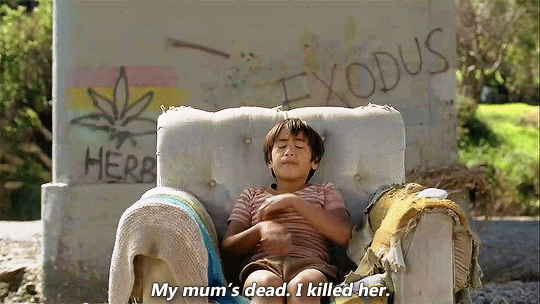


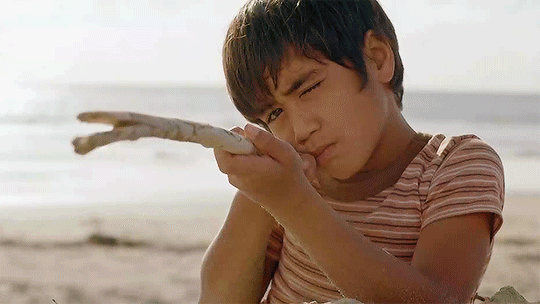



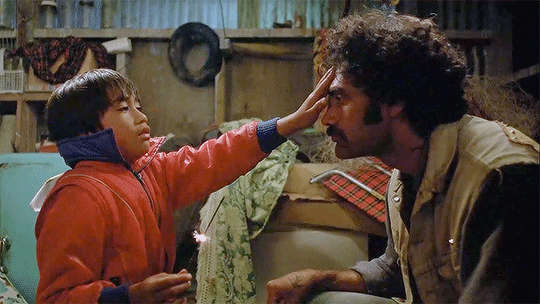

Rocky + magic
Boy (2010) dir. Taika Waititi
#boy (2010)#taika waititi#cricket gifs#do u get it.#this is like. a gifset about an essay i have simmering in the back of my head so here comes some long ass tags#rocky actually has magic first of all we love magical realism#second of all he has to learn to reconcile his powers (which he believes killed his mom) with his potential to do good#with those powers#so when he knocks alamein over that's a turning point bc he suddenly realizes he Could kill his only remaining parent too#so he imagines himself bringing back the rat from the dead while he's at joanie's grave#an obvious representation of his desire to be able to bring his mom back with the powers that killed her#then alamein starts to talk about how much he loves ET (and rocky wants to be loved) for his healing powers#so the next time we see rocky trying to use his magic after that is on leaf#but then he uses it on alamein#doing literally everything he can with the sparkler and the red jacket and the roller skates#to say i want to connect with you i want to be your son please forgive me#for killing her#sorry for what i did to mum#and it works. it works.
1K notes
·
View notes
Text
Supernatural writers tried to do with John what Taika Waititi did with Alamein and they failed. miserably.
#you will never be Alamein#Angeles said he did it in 90 minutes while spn had 15 seasons#nothing about John humanizes him to me#but I guess Alamein really isn’t as bad as John idk. i guess the point of this is to say that they tried to get us to be sympathetic to both#and one succeeded and the other failed#also this isn’t a complete thought so if you have another opinion it’s fine just have some backing I guess
6 notes
·
View notes
Text

This is a book for readers of second world war history who like the Boy’s Own version of the conflict. The cast of characters could have stepped straight from a comic strip story. Yet the men of the SAS were real flesh and blood, “rogue heroes” as the title suggests. The organisation now famous for its derring-do, and as famously secretive, has opened its archive to the historian and journalist Ben Macintyre, so that he can produce the first authorised history of what the SAS did in the war.
Macintyre has made the most of the opportunity. The history needs scarcely any embellishment, though he tells it with flair: the simple facts of SAS activity make the “ripping yarns” of comic book heroes pale by comparison. The organisation was the brainchild of two officers posted to the war in Egypt, David Stirling and John “Jock” Lewes. Stirling was an awkward soldier, hostile to spit-and-polish and authority, charming, fun-loving and irreverent (“layer upon layer of fossilised shit” was how he described military bureaucracy). Bored by life in Cairo, he discussed with the ascetic, hard-working, serious-minded Lewes, his complete opposite in personality, the possibility of creating a unit of awkward men like himself, who wanted action, few rules and adventure in small hit-and-run assaults behind enemy lines. Astonishingly, Stirling persuaded the high command in Cairo that he could achieve something significant at low cost in men and materials. The chief of British deception in the desert war, Dudley Clarke, gave the unit its name. Already fooling the Italians with a bogus parachute unit, the First Special Air Service Brigade, he lent the name to Stirling, and the organisation has borne it ever since.
Macintyre uses the SAS war diary as the backbone of his narrative, and is candid about failure as well as the hard-earned successes. The SAS was an irregular unit, its members drawn from an extraordinary range of backgrounds – a spectacles salesman, a textile merchant, a tomato farmer, amateur boxer, and so on – with a range of motives to match. Some wanted excitement, some liked killing and made no pretence about it, some were escaping from their past, some were too eccentric for the ranks; all had to be fit, alert, crafty, ruthless if required and dedicated to the mission. Stirling was also aware that his outfit did not meet with approval in conventional military circles, which saw war as face-to-face, not behind the back. Churchill liked the force, and would no doubt have joined it had it existed in his youth. But through the campaign in North Africa, then Italy and Germany, the SAS had always to prove itself, in order to stave off disbandment.
The new unit nevertheless made a disastrous start and indeed had mixed fortunes throughout the war. The first operation, code-named “Squatter”, carried out while the handful of volunteers were still feeling their way, could not have gone more wrong. Poorly trained as paratroopers, the group nevertheless flew off into a desert storm trying to land at pre-planned dropping zones well to the rear of the enemy. They landed in the worst places, faced a Saharan downpour of biblical proportions, lost some of the troop to injury as they hit the ground, and were then unable to retrieve the parachuted supplies. With explosives so soaked they were worthless, uncertain about their whereabouts, short of food and water, the remnants of the original units made their way back to Egypt. Out of 55 men, 34 were killed, injured, captured or missing without a single achievement.
Macintyre makes the point that this was by no means the end of a madcap idea. Stirling recruited the Long Range Desert Group to take the SAS teams by Jeep or truck rather than risk any further parachute drops, and the second set of raids in December 1941 resulted in the destruction or disabling of 60 enemy aircraft. But Operation Bigamy, a series of raids against Benghazi shortly before the battle of El Alamein, was another disaster. It featured one of the most bizarre figures to emerge from the story: a Belgian textile merchant, Robert Melot. Fluent in Arabic, keen to get at the Germans, he volunteered for the SAS aged 47 as an intelligence officer. He used his range of Libyan contacts to glean information needed for the raids, but in this case Melot miscalculated. An Arab double agent alerted the Germans and Italians and the raids were a disaster. Once again a forlorn, bearded, hungry and damaged band straggled back to Cairo. Melot carried on his SAS career regardless, and died not from his many scrapes in battle, but from a Jeep accident on his way to a party in Brussels late in 1944.
The SAS came of age in the campaign in Italy, where it was used as a more conventional raiding party, the Special Raiding Service, under the command of Paddy Mayne following Stirling’s capture in Tunisia in late 1942. The Italian campaign was a particularly grisly one, and the SRS (with its core of SAS men) found collaboration with the partisans and rivalry with the Special Operations Executive (SOE) a challenge (unlike the SAS, the SOE always linked up with local resistance). Macintyre spares none of the details; the SAS fought a dirty war against an enemy they regarded as every bit as dirty. Prisoners were rare, but in return Hitler condemned irregular commando units to death if they were caught. Not all were killed by any means, but many were, just as the Germans killed all the other irregular, partisan forces ranged against them.
In October 1945 the army wound up the SAS and it continued to exist by subterfuge, a unit of war crimes investigators searching for evidence across Europe that SAS members had been murdered. In 1947, to meet the many crises of empire, the SAS was revived. What it did then and since can be guessed at, but until the postwar unit diaries are revealed, like the wartime diary used by Macintyre, the exact details will not be known.
What in the end did the SAS achieve in the war? Macintyre does not really say, leaving the narrative to speak for itself. It did not, as some of the book’s publicity has suggested, turn the tide of war. Its overall accomplishment, set beside those of the Commandos, or the SOE, the Chindits or other partisan groups, was strategically modest, whatever its tactical successes. But the SAS did bring to life the plucky, maverick, individualist hero of the comic strip, a very British way of making war. SAS: Rogue Heroes is a great read of wartime adventuring, in a long, grim war of attrition where adventure was hard to find.
Daily inspiration. Discover more photos at Just for Books…?
26 notes
·
View notes
Note
GIGGLES! May I please humbly request Lee Shigure and ler Alamein from fruits basket? 🥹 I haven't finished the show yet, but those two are so 'fruity' together they're so cute! 🥰 Perhaps they are talking about their school days again and bring up the topic of the fights they'd have?
No pressure! Ily you're amazing! 🥰💙🩵💙🩵💙
Oh, you're sweet, Raichi! Thank you :3 And oh my god YES! Ayame and Shigure are so- kjarekjakjjkearjej XD I've gotcha covered!
Cloud 9 (Taglist peeps):
@baby-tickles2022 @cupcake-spice13 @sarahmaystock5578 @sevenincubistolemyheart @riisada
“Oh my…would you look at this?” At Ayame’s fond sigh, Shigure looked over at the velvety cheetah print coat. “My student council uniform! Doesn’t it bring back such fond memories?”
“It does- and it’s well cared for.” Shigure scooted over, feeling the fabric with careful fingers. They were cleaning out Hatori’s attic for him while he was busy at the main house- mainly because most if not everything up there was theirs. It was both a busy task and a walk down memory lane. “Not a thinned thread in sight.”
“It is! Say, do you think Yuki would like this? Oh, it’d bring out his eyes!”
Shigure didn’t have the heart to tell him his brother would likely burn it. Instead, he reached into the box, pulling out a framed photo of them in highschool. “Hey hey, check out these handsome devils. This is when we all moved into that little apartment together.”
Folding the coat, Ayame leaned into his shoulder to get a better look, eyes softening as he took in their young, smiling faces. “How lovely. Those days were some of my favorites- the three of us staying up late watching movies, planning our trips for the weekends to come.”
“Burning breakfast, getting into silly fights over this and that.” Despite the wording, Shigure spoke of these events with great fondness, laughing to himself at one particular. “Those were good times all around.”
“I agree…say, do you recall the time you borrowed my favorite suit?” Ayame asked, something of a secret smile playing on his lips. Shigure hummed in thought, rubbing his chin.
“Hm…no, I don’t recall. Care to enlighten me?”
“It was dawn- a cold winter morning. The student council were planning the mid-season ball, and you know how I love a good party..” Ayame wrapped an arm around Shigure’s waist, tugging him close as he spoke. “However- when I went to my closet, it was missing! In its place was a single piece of paper- folded into the shape of a dog.”
The hand on Shigure's waist curled some, making the other haired man stiffen. “You don’t sahahy?”
“A classic calling card if I do say so myself. I knew immediately who took my precious suit! I went to your room that day and found you faking a sleep.” There was a gentle press to his lower ribs, earning a huff of laughter from the dog. “You were in bed for once- a sight uncommon given how often you stay up to write.”
“Cahahhahn’t let the gihihihihirl’s dohohohwn! Yoohohohu know how muhuhuch they lhoohohve my wohohohork!” Shigure giggled through his words, squirming some against Ayame’s hand. “Whahahat hahahappened nehehehxt?”
“Hm…you know- I think it’s one of those things you just need to experience.” With that, Ayame attacked full on, pressing his nails into the soft spots along Shigure’s rib cage while his other hand grabbed his thigh. The dark haired man let out a howl of laughter as he fell back, writhing on the floor as his friend attacked his tickle spots. “I must say, your reactions are quite lovely.! Come on, tell me what you remember now?”
“Aheahhahahahhahahaha! I cahhahhahn’t seeheheheheem to rehehehehehcall! Cohoohohohuld you explahhhahhain furuhuhuhurther?”
“So greedy~” Ayame cooed as he climbed on Shigure’s hips, keeping his touch light as he scribbled into the various sensitive parts along his torso. “I did this, you see? I climbed on top of you and started tickling like there was no tomorrow! You were mighty ticklish back then.” Shigure snickered at the yipping sound Shigure made when his fingers touched the tips of his hip bones. “Seems that hasn’t changed at all.”
“Aheahhahhha! Sohohohoohho it sehehehehe-EHEHEMS!” Shigure arched with a proper laugh as Ayame kneaded the terrible spot, hair a mess and robe starting to come undone, the fabric spreading like water across the floor. His cheeks were rosy, warm and lovely to match the smile on his lips. “AHAHAHHAYA, PLEHAHAHAHAHSE!”
“Hehe, okay okay.” He moved his hands up back to his ribs, easing Shigure’s hysterics back down to a softer giggle fit. “Where was I? Oh- yes. I asked you where my research was, and you insisted you didn’t know! Unfortunately for you, I can smell a dirty liar when I know one!”
“Whohohohoho are yoohooohohu cahahhahalling diihihihihirty?”
“Just at the time, love. No one smells fresh during a early morning.” Ayame planted a kiss on his forehead before moving up to Shigure’s highest ribs, earning another proper yip sound. “I had to go for the big spots if I wanted you to confess. Your hips were a good place, but if I knew him, I’d go for…here!”
“AHAHAHHAYAME!” Shigure all but shrieked when his armpits were suddenly attacked, throwing his head back and kicking his feet against the wooden floor. “OHOOHOHKAY OHOHOHOHKAY I REMEHEHEHHEEMBER!”
“Oh, do you? You sure?” Ayame cooed, laughing when Shigure nodded frantically. “Hehe, okay- I believe you.” He pulled his hands back, climbing off his friend before resuming his tale. “Eventually, you confessed to it all. I found my suit hanging in your closet! Silly thing, weren’t you?”
“Hehehe..hehehehe..stihihihll am I suhuhupose.” Shigure pushed his hair back from his face, blinking up at the old familiar walls around him. “I don’t think I went to the ball that year. Was it fun?”
“Oh darling, it was amazing! Though it would have been much more special with you.” Ayame smiled as he pulled out an old notebook, flipping through the pages of his companion’s old handwriting. “Look here- I found your old work! Care to read it?”
“Hmm..later. Right now- I want something else.” Shigure didn’t give him a second to react, pushing Ayame over and going right for the ribs. “I want revenge!”
The attic would be cleaned later.
Thanks for reading!
#fruits basket#shigure sohma#ayame sohma#tickle#tickle fic#fluff#God I miss writing for this show#It's so comforting and lovely and GAH!
19 notes
·
View notes
Text
The War Magician: Jasper Maskelyne
His magic fooled Hitler’s army.
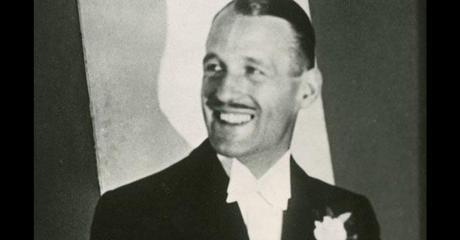
Jasper Maskelyne was a British magician who created monumental illusions that tricked the German army and helped the Allies win World War II.
Jasper was born in London in 1902 to a family of magicians. His grandfather John Nevil Maskelyne was the inventor of the classic levitation trick that is still popular today.
At the beginning of World War II, Jasper joined the Royal Engineers, a corps of the British Army. He suggested to his superiors that his unique skill set could be useful to the war effort. They were skeptical, until Jasper created the illusion of a German warship on the Thames using mirrors and a cardboard model.
Jasper was recruited to work for military intelligence in Cairo. He created ingenious devices to help soldiers escape if they were captured. These life-saving tricks included saw blades inside combs, and maps hidden in playing cards.
In 1941, Jasper was assigned to a new deception department known as “A Force.” He immediately gathered a group of talented artisans including a carpenter, electrician, architect, set designer, artist, and art restorer. They called themselves the Magic Gang.
The Gang’s first job was disguising army vehicles, using painted canvas and plywood to make jeeps look like tanks and tanks look like jeeps. They then moved on to a much bigger project: protecting the harbor in Alexandria, Egypt from attacks by the German air force.
Incredibly, Jasper and the Magic Gang created a fake harbor near the real Alexandria harbor, using dummy ships and houses made of mud and cardboard. They lit up the fake one, and turned off all the lights in the real one. During a German raid, Jasper set off bombs in the fake harbor. The Germans were confused and assumed other pilots were hitting the target, so they dropped their missiles on the fake harbor, thereby protecting the real port of Alexandria.
Jasper’s next project involved the Suez canal. He was instructed to increase anti-aircraft lights around the canal so British soldiers could spot Nazi planes in the dark. Instead, Jasper created a revolving cone of mirrors that turned regular lights into strobe lights. This disoriented German pilots and made them crash into each other.
The Magic Gang’s biggest illusion occurred in July 1942, during the Battle of El Alamein. German Field Marshal Erwin Rommel had conquered large parts of North Africa, and British Field Marshal Bernard Montgomery wanted to capture back El Alamein, a town on Egypt’s Mediterranean coast.
Jasper’s job was to mislead the Germans into believing that the Allied attack was coming from the south rather than the north. In the north, he and his team disguised 1000 tanks as regular trucks, while in the south they created 2000 fake tanks. Using sound effects and other illusions, Jasper and his gang misled the Germans into heading south, while Montgomery attacked the north. The Allies won the battle – the first decisive victory against the Axis powers in North Africa.
The Magic Gang split up after the Battle of El Alamein, and Jasper spent the rest of the war entertaining troops. Winston Churchill thanked him for his valuable service, but the magician was frustrated that he never received formal recognition for his heroic actions.
After the war, Jasper created a traveling magic show which performed in small towns around the United Kingdom. The troupe began by headlining at top-level venues, but Jasper began drinking heavily and gradually the venues got smaller and seedier.
With his second wife Mary, Jasper moved to Kenya, where he bought a farm and gave magic lessons to residents and tourists. He died in 1973.
Under the British Official Secrets Act, the complete story of the Magic Gang can only be made public in 2046.
For using his incredible talent as a magician to fight Hitler, we honor Jasper Maskelyne as this week’s Thursday Hero.
43 notes
·
View notes
Text
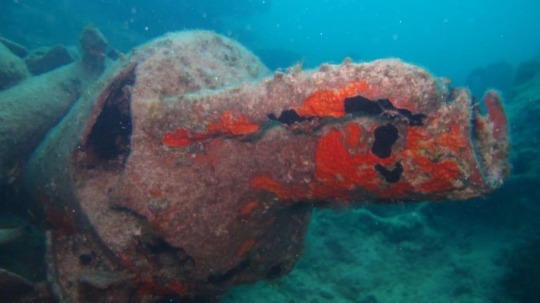
2,300-Year-Old Shipwreck Filled with Wine Jars Found off Egypt
An engineer was conducting a regular survey of the Mediterranean Sea off Egypt’s coast when he noticed something in the water.
It turned out to be a 2,300-year-old shipwreck, according to an Aug. 5 news release from Egypt’s Ministry of Tourism and Antiquities.
The ancient ship was discovered less than a half-mile off the coast of El-Alamein — which was an important commercial region during the third century BC, Mostafa Waziri, secretary general of the Supreme Council of Antiquities, said in the release. The find gives more insight into Egypt’s role as a center for trade, economy and tourism in ancient times.
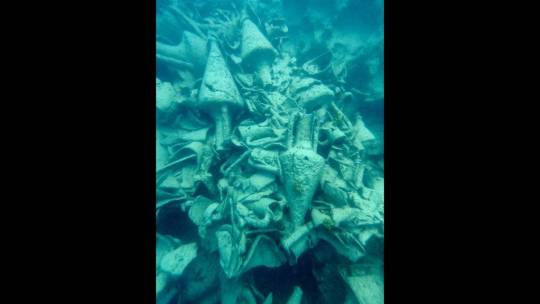

Archaeologists at the site discovered a number of ancient artifacts in the ruins of the ship, including wood from the boat, hundreds of pieces of pottery, and a number of jars that were imported from Rhodes, a Greek island, officials said.
The Greek jars, also known as amphoras, were used for storing and transporting wine, according to archaeologists. Experts said the ship’s contents indicate that it was a merchant ship.
They were found on a sunken island next to the ship, confirming that the wreck probably occurred because it collided with the underwater landmass.
Officials said excavations of the ship will continue.
El-Alamein is about 170 miles northwest of Cairo.
By Moira Ritter.

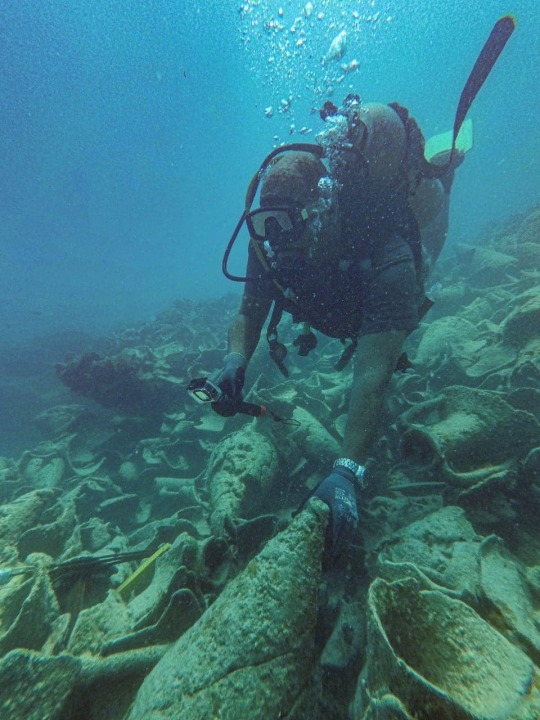
#2300-Year-Old Shipwreck Filled with Wine Jars Found off Egypt#El-Alamein#wine jars#greek jars#amphoras#ancient artifacts#archeology#archeolgst#history#history news#ancient history#ancient culture#ancient civilizations#ancient shipwreck
18 notes
·
View notes
Text
Breaking down the comics: Dreams and knowing oneself (Issue 22)
Moon Knight, Issue 22: The Dream Demon / Moon Over Alamein
Another double feature guys!**
Also LOOK AT THIS COVER. They've dug this cover up SO many times because it's just that amazing! LOOK AT IT.
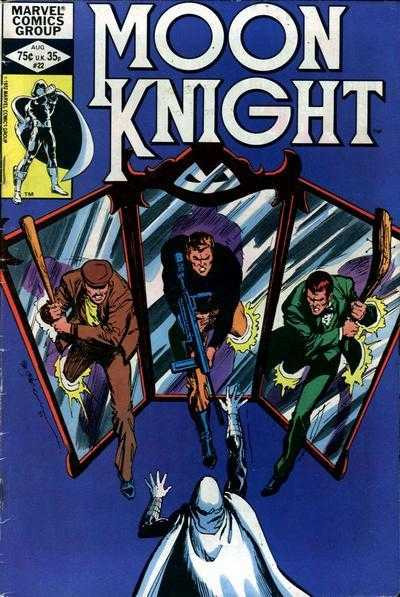
Bill Sienkiewicz ate his wheaties that day.
….Why does Steven have a bent club with nails in it? Steven… Sir…
Alright. Dream demon Morpheus is back.
Moon Knight had his regular villains back in the day. Morpheus was one of them. A man that can affect the mind and cause nightmares.
An interesting villain to a hero that comes with his own traumas, nightmares, and mental health problems.
We open to see a man having a bad dream.
"Unlike the beneficial effects of normal dreaming, the shroud of pavor nocturnus holds no soothing psychic balm. Rather, night terrors are profoundly disturbing to the slumbering psyche. Indeed, clinical sleep research has shown the phenomenon to be completely unrelated to ordinary dreaming, and thus the antithesis of subconscious healing."
That's a long way to say that not getting enough sleep or dreaming normally can mess with you and cause even the most mentally stable to crack.
It depicts a man who is in the throws of a night terror. In fact, it tells us that this man is Peter Alraune!
We met him before.
The narration comes on to talk about how night terrors are typical for children of a certain age and that they are characterized by abrupt awakenings and little recollection of the dream-like experience.
But Peter remembers his nightmare. "He's after me...Coming to get me... He's after me. Morpheus is after my very soul!"
Meanwhile, in New York, we see a taxi cab cruising the streets. "Aimlessly without a fare, yet ignoring all potential riders."
Jake is restless, getting a strange feeling that he needs to check on Morpheus. Oddly specific feeling.
So he dons the Moon Knight cowl and heads up to the research facility where Morpheus is being kept and checks in on him.
Morpheus is sound asleep, but then two janitors pop in to mop the place.
The older Janitor explains who Morpheus is to the younger janitor. How Alraune gave him experimental drugs that left Morpheus mutated and unable to sleep or dream.
Turns out that the research facility dopes Morpheus up each night to help him release his bent up dream energy to keep it from going off the walls again.
However, according to the expose janitor, Morpheus is getting resistant to the drugs so they have started using something new to help him dream.
Moon Knight figures that Morpheus is taken care of, so he's about to leave when suddenly he's attacked by someone in the shadows!
Just as Moon Knight is about to finish off the shadow guy he suddenly sees Marlene falling off the roof!
Just as he gets to the roof edge, he realizes that Marlene isn't there! But the shadow figure instead pushes him off the building!
Moon Knight does what he does best and lays on the ground in a daze for a moment.

Figuring he's exhausted, he decides to change back to Lockley and head over to Gena's for breakfast.
Jake complains to Gena and Crawley about his hallucination or waking dream.
Crawley tells Jake about how dreams are hallucinations and that in some cultures that dreams are as good as reality.
I just want to say that in these pannels it's so wonderful to see Jake in his element. The diner, the friends, and drinking his bad coffee. Gena even remarks that she made his eggs just how he likes them "Runny".

Anyways, Jake takes off, still feeling ill at ease.
Samuels, the butler, meets Jake outside and tells him to use the garage entrance, as someone is visiting. Marlene's brother, Peter!
Jake takes off running to quickly change.
"Being four people ain't easy... And between Lockley, Spector, and Grant, not to mention Moon Knight, it gets downright scarey. In fact, my biggest fear is that whichever personal I adopt, It'll be somehow destroyed by the other three..."
OKAY. Let's... Take a moment to look at that.
It's hard to say who is speaking here. Jake was the one that arrived at the house, but he's in the process of switching out to deal with Marlene and her brother. In this moment, he should be going to Steven, as this is Steven's area. But sometimes in between changes, we see Marc when he's alone.
But is this a fear of all of them? That somehow they will be deemed unacceptable and destroyed by the others?
I think this might be a realistic worry that some part of them is seen as not needed and gotten rid of. Perhaps it is Steven who worries that his lavish dealings are not needed. Or Jake who struggles to live his own life with his friends. Or even Marc who hates his life so much that he often self-destructs.
Marelene interrupts their musings, calling for Steven to come calm her brother down.
Peter is down in the library having his own little nervous breakdown.
Peter explains to Steven that he keeps having recurring dreams that Morpheus is coming for him. The night terrors are getting so bad that he's growing physically ill.
He worries that he himself is growing to be more like Morpheus due to his lack of proper sleep and dreams. That he might mutate and become the monster too.
Peter has started to study Oneirology (the study of dreams) and sleep science. He believes that dreams and the hormones and chemicals around dreams are the key to things like ESP and telekinesis and the likes.
Peter describes a dream he has of Morpheus waiting outside his window before shattering it. He then wakes to find the window intact, but a glass he left next to the window broken without cause.
Steven sends Marelene and her brother up to their vacation home in Maine to get some rest, driven by Frenchie. He has his own research to do.
But as Frenchie drives, Peter falls asleep and suddenly Frenchie is hallucinating a giant monster in the road! He swerves to avoid it and crashes.
Meanwhile, Moon Knight is up visiting Morpheus again, checking him fully this time to see if he's really dreaming.
The shadowy figure shows up again and attacks him from behind!
Moon Knight gets in a good hit and the figure flees.
This time, Moon Knight gives chase!

He’s in for a good time.
I love how he’s drawn when he’s startled or confused. A blank face in darkness but those little eyes still give away SO MUCH.
He dreams of a New York blasted to rubble by a nuke.
Also of a weird gruff clown that asks him how Marlene is.
Moon Knight takes it in stride.

I can’t stress enough how well Moon Knight has always dealt with things like this. Odd things that don’t make sense. Things that might make other people freak out or realize something is wrong. He just takes it as it’s presented to him and goes about his merry business.
This is an extreme coping mechanism for someone used to dealing with extreme stress, trauma, survival, and also just weird things.
In the tunnel, Moon Knight comes across models in bikini's being judged by men in top hats in innertubes in a pool.
One of the ladies declares Moon Knight to be her "white knight" and asks to be rescued. He just kinda shruggs and goes "Sure--Right this way."
And then he's attacked by large screaming bats.
"Into that tunnel up ahead! Bats hate caves!"
Yeah... this... this is gonna get weirder people.
Then the model he's rescuing turns into Marlene, complaining about Bloomingdales to Steven.
A huge snake appears and attacks him.
Marlene declares that she can take care of it. She walks into the snake's mouth and uh... I'm not sure what this is supposed to imply but I’m sure it implies something.

And just like that, he wakes up in a subway on the tracks with a train heading right to him!
He dives out of the way just in time and finds the shadow man still running from him.
It would seem that even in his dream state, he still managed to chase the man.
"I've got to overcome these bizarre dream attacks [...] But I can't just give up and let this guy get away! Got to risk the dreams--Try to stop him before I"m lost in that nightmare world again!"
He momentarily gets the best of the shadow man when suddenly he finds his worst nightmare.

I adore this art. The reaction. THe hand. The difference in style with the three of them.
It also further points to my theory that Moon Knight is his own alter. He is not Marc, Jake, or Steven. Maybe he isn’t a fully realized alter and not fully self aware of being his own person, but he really is his own person.
Now we get to see how Moon Knight himself deals with the trio. His different views on them and how he thinks they might see him and themselves.
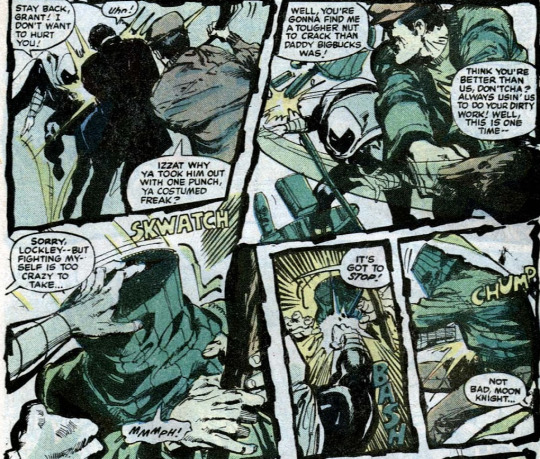


As sad as it is, I’m cheering because this is the first time Moon Knight has declared himself his OWN person. “I’m Me! I’m Moon Knight!” He has gained self recognition!
But what does this mean for him and the others?
Moon Knight breaks free of the dream and finds himself beating up a store manikin in a street. He looks up in time to see Lockley’s cab careening down the street towards him being driven by the shadow man!
He makes work of the crescent darts and gives the cab a flat tire (Lockley's gonna be pissed later).
The cab crashes into a light pole.
The shadow man attacks him again and Moon Knight attempts to fight off the dreams.
He uses his crescent dart to stab himself in the leg to attempt to wake himself up!
He stabs himself over and over again as he fights off the shadow man.
He knocks the shadow man down.
Cut back to Peter, Marlene, and Frenchie! An ambulance has arrived to the scene of the car crash!
But Peter is missing! The ambulance driver informs them that they didn't find another passenger and only them!
Moon Knight unmasks the shadow man only to find PETER!
"The man who's been trying to kill me for two nights running is Marlene's brother-- Peter Alraune!"
Back at the research facility, the two janitors run into a very much awake Morpheus!
Turns out the drugs they were forcing into him to help him dream was only making him stronger till he linked up with Peter and gave Peter the ability to induce dreams and use him as a pawn!
Oh no! A Cliffhanger!
This one is really something else! The fear of the other alters trying to make him go away. The declaration of Moon Knight being his own person. The art and the weird dreams!
**This is going to be a multi-parter as I’m going to review the next one then come back and do the mini story! Stay tuned for part two!
#Moon Knight#Moon Knight Comics#Analyzing the comics#Steven Grant#Marc Spector#Jake Lockley#Marlene Alraune#Classic villains#Hot damn this one goes hard
11 notes
·
View notes
Text
it does actually hit so hard to think about the fact that alamein and joanie were properly in love though. like he’s alamein ranginui. they were MARRIED. they met at school and even then he knew she was the one. "this used to be my room" implying that alamein has lived somewhere else since - they probably lived in their own house for a bit. the photos of them hung up in nan’s house. alamein talking to her pregnant stomach. like, it’s all so much, but it hits even more to think about how we don’t see any photos of them together after boy is born. alamein isn’t there in any of boys memories. joanie died in her mother-in-law’s house. where did it all go
#THIS is what i mean by saying boy is a love story#yes they all love each other a lot but the fact that this love is so hidden. its definitely there though#boy 2010#death mention
70 notes
·
View notes
Text
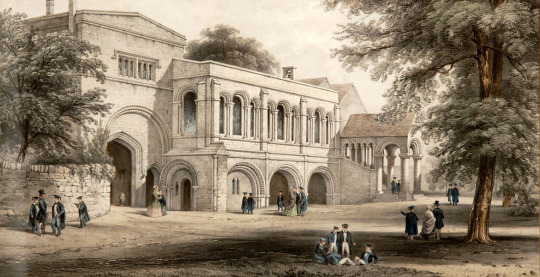
The King's School, Canterbury, is not only Britain's oldest Public School, but is also considered to be the oldest continuously operating school in the world; since education on the Abbey and Cathedral grounds has been uninterrupted in Canterbury since AD 597.
The wearing of Full Canterbury Dress (the name given to the school uniform: white shirt with wing collar, pinstripe trousers, black jacket, black socks, black tie and black shoes), is a tradition that is still carried on today. Though, Captain of School being allowed to grow a beard and keep a goat on Green Court (the large lawn in the centre of the school), are traditions which have fallen into decline. Neither is he still allowed to keep a wife and take her to lessons!
Notable alumni of King's, Canterbury, include: Christopher Marlowe, W. Somerset Maugham, and Bernard Law Montgomery, (later to become Field Marshall, 1st Viscount Montgomery of Alamein, KG, GCB, DSO, PC, DL).
Interestingly, although King's Canterbury, has no official coat-of-arms, it uses those of Canterbury Cathedral Priory (denoting King's origins as a cathedral school). The cross on the shield has an obvious meaning for a cathedral and its school; the letters i and x serving as reminders that the Cathedral is dedicated to Jesus Christ.
7 notes
·
View notes
Text
Universal truths in boy's own adventure
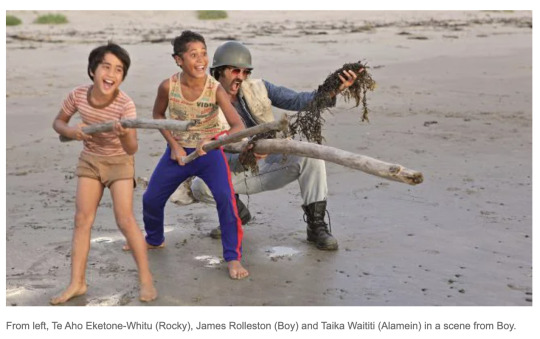
By MICHAEL BODEY
THE AUSTRALIAN
12:00AM AUGUST 25, 2010
TAIKA Waititi is still pinching himself at the success of his second film, Boy.
He concedes New Zealand films don't do as well on their home turf "as, I imagine, many Australian films don't do crazily well".
Boy doesn't exactly scream "hit", being a coming-of-age story set in 1984 on NZ's rural east coast and starring an unknown 11-year-old.
But Waititi's film is the highest grossing local film in NZ history. Its box-office take to date of $NZ9.3 million ($7.4m) surpasses Once were Warriors and The World's Fastest Indian, both of which earned more than $NZ7m.
"In my head I thought around $NZ2m would be nice, twice what my last film [Eagle vs Shark] made, and it's just kept going and going," Waititi notes.
"The feedback and response by local audiences is something none of us really expected."
Boy has been a success because New Zealanders want to see themselves on screen, but its tone is more tragicomic, self-deprecating and relaxed than audiences are used to. It focuses on universal themes of family and the insecurity, clumsiness and wonder of growing up.
James Rolleston is the Boy, a Michael Jackson-obsessed kid living on a farm with his Gran. He idolises his father, Alamein (played by Waititi), a man he imagines is a deep-sea diver, a war hero and a relative of Jackson.
The reality is underwhelming: his itinerant and unreliable dad has been "in the can" for robbery and is little more than a rebel biker without a cause.
"Anyone who has a parent can relate to this idea of not quite understanding who your parents are or making up stories about them," Waititi says.
"Then there are the realities of who they are and their secrets and [realising] they're not superhuman human beings."
Global audiences understand the film, he adds, even if some are surprised to discover it's not a family movie. A Hawaiian festival director programmed the film before seeing it. "Halfway through he asked me, 'Just out of curiosity, is there much more swearing or violence?' "
Australians will find Boy sweet, raucous and lovably NZ, with its recognisable cultural references, language and intonations. It won the audience awards at the Sydney Film Festival and Melbourne International Film Festival this year.
The film upends certain cliches about NZ cinema globally, although Waititi is still smarting from one US review, in trade newspaper Variety, that accused it of misrepresenting Maori culture.
"[The reviewer] almost took it personally that there weren't ghosts and people in villages riding whales," Waititi says.
Waititi played against local expectations, too, after winning an Academy Award nomination for the short film Two Cars, One Night. "Essentially that was a dramatic short and people assumed after that I would go down the drama road and make typical New Zealand films, dark films about kids who die," he says.
"So I ended up moving away from that and trying to inject some quirkiness and comedy. Maori get pigeonholed into the idea they're spiritual and telling stories like Whale Rider and Once were Warriors, quite serious stuff, but we're pretty funny people and we never really have had an opportunity to show that side of ourselves, the clumsy, nerdy side of ourselves, which is something I am."
Waititi is something more than clumsy and nerdy. The 35-year-old has a background in painting and photography, having exhibited in Wellington and Berlin. His acting and comedy emerged on the side, as he performed with mates including Flight of the Conchords's Jemaine Clement and Bret McKenzie, directed episodes of their US series and gave popular stand-up comedy shows. The semi-autobiographical Boy was the first, tentative screenplay he wrote as he mulled the prospect of being able to move from shorts to feature films.
"I kind of freaked out a bit, I didn't want to leap into it because the transition between short films and feature films is the same as short stories and novels," Waititi explains. "Some people just can't write a novel and some people can't make a feature film, it's just the way it is sometimes. Maybe I couldn't have made a feature film."
Now that one's settled, Waititi is in the enviable position of being able to juggle directing and acting. He has just finished filming a performance in the big-budget studio superhero film, Green Lantern, and expects a sequel to follow.
"Yeah, for my film work I'm in a good position in New Zealand. I could probably make my next film pretty easily," he says with honest understatement. "You're always fine until you stumble and then obviously it becomes harder. The acting thing crept up. I'm not sure how much attention I'll give it.
"I'm lucky my main job now is filmmaking, so it's not like I'm rushing off to LA to do all these auditions and desperately trying to be an actor.
"I think I'm a better filmmaker than actor, so I already know that. That's OK, I can handle not being a famous actor."
He remains unsure whether he can sustain himself as a filmmaker in NZ, even though he doesn't appear particularly rushed to take up any international offers.
He believes he can remain in NZ "if you don't expect what we all thought was the high life of a film director in the 90s when people were being paid squillions of dollars just to do anything".
The money in filmmaking has dried up; today it really is just like any other job.
"The glitz and glamour has gone and you get paid a normal wage to do a job that isn't extraordinary," he says. "So it's kind of fair. I think people were overpaid for what the job is, having fun and telling stories and getting all this cool stuff."
Waititi appreciates that the films he wants to make won't generate the fortune of blockbusters such as Green Lantern, but he doesn't want dedicate two years of his life to a project he's not passionate about.
"The stuff I'm passionate about is what I write, it isn't multi-million-dollar franchise movies," he says.
But with the success of Boy, could there be pressure to create a sequel or franchise out of its characters? Waititi looks across to Rolleston and raises an eyebrow.
"Maybe I'll just make this into a franchise, do the Truffaut thing and just keep hiring him until he's 40."
Boy is in cinemas tomorrow. SBS One screens Eagle vs Shark on Saturday.
#this is insane to read in 2022#TAIKA#? ?! !#this was worth the scramble to access it#so much to unpack here
26 notes
·
View notes
Photo
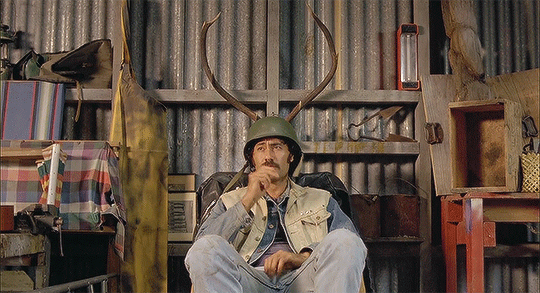
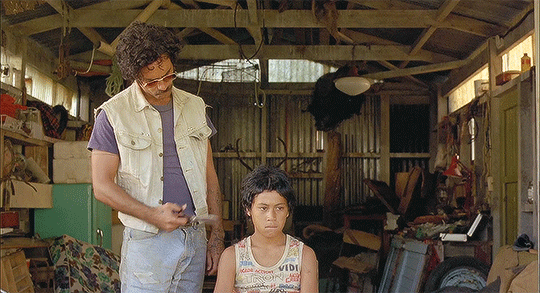
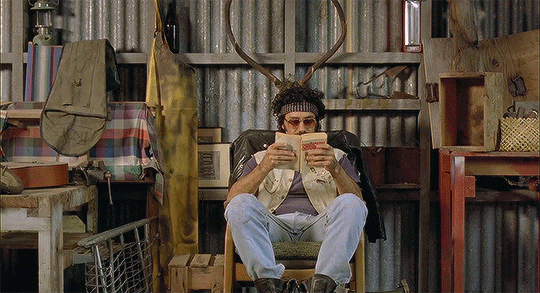
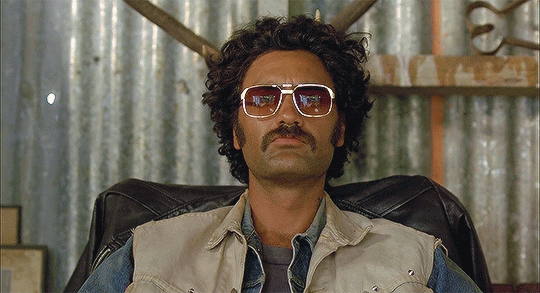

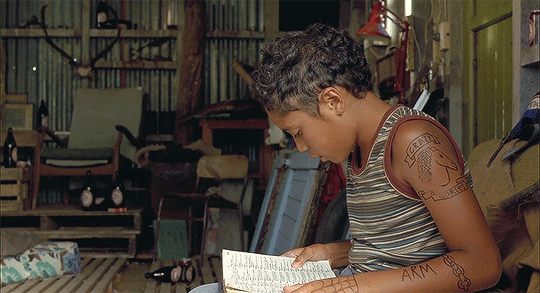
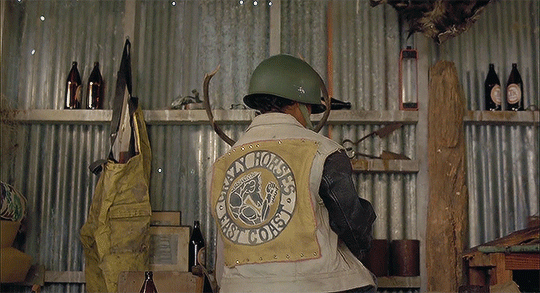

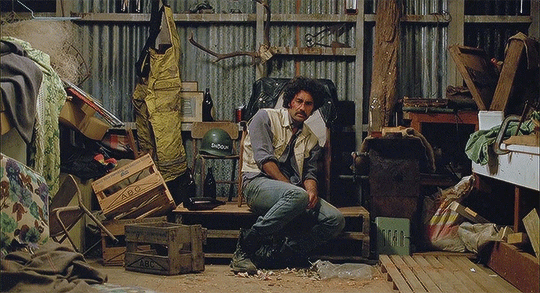
Antlers are associated with power, growth, and resurrection. They serve as a defense and deterrent from predation; when broken, they grow back completely.
Boy (2010) dir. Taika Waititi
#HAPPY TAIKA TUESDAY EVERYBODY#SOOOO UM A FEW THINGS.#second gif stoned haircut scene. the antlers are framed to look very small for boy#like this either represents that the antlers are growing in for him in this scene#as it's a very literal transformation for boy allowing alamein to take him into his own hands per se#and as a result allowing alamein to live the fantasy represented by the crown of antlers#OR.#it is positioning boy as a baby deer#a younger version of alamein essentially#something something mr langston saying boy is a lot like alamein used to be#NEXT#fourth gif alamein is staring DIRECTLY. at the camera#this is the peak of his fantasy he holds all the cards at this point he has Become shogun. he believes he is the protagonist#so he looks directly at the audience watching what he believes to be a story about him#interestingly when boy sits on the throne he is looking up not forward/at camera#AND.#i didn't notice until i was making this that boy sitting on the throne is the last time we see the antlers until#alamein's fantasy is completely destroyed#if we look at it thru protag theory that implies that as the protagonist boy simply taking alamein's role for a minute#even though it ended badly for boy#started the destruction of alamein's fantasy#AND FINALLY#the growth/rebirth symbolism around antlers is very interesting considering the way the antlers are broken#in the last two gifs#and then it immediately cuts to the next morning#and the rest of the film after that is very much themed around new beginnings#especially when you take into account the shot of the finished carving on the chair#that deliberately excludes the antlers from frame#anyway. that's all of it! jesus christ#if you read this far i'm kissing you on the mouth
618 notes
·
View notes
Photo
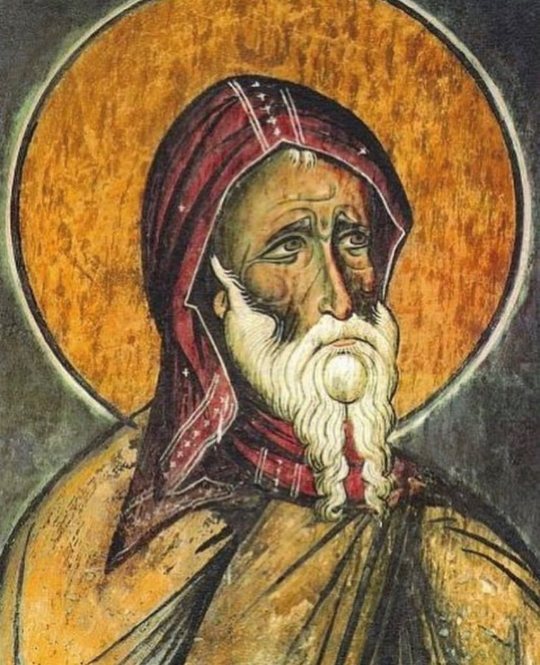
Today we also celebrate the Venerable Poemen the Great. Saint Poemen was an Egyptian by birth and a great ascetic of Egypt. As a boy he visited the most renewed spiritual men. He gathered tangible knowledge from them, as a bee gathers honey from flowers. Poemen once begged the elder Paul to take him to St. Paisius. Seeing Poemen, Paisius said to Paul: “This child will save many; the hand of God is on him.” In time Poemen was tonsured a monk, and attracted two of his brothers to the monastic life as well. Once his mother came to see her sons. Poemen did not allow her to enter but asked her through the door: “Do you desire more to see us here, or there, in eternity?” The mother withdrew with joy, saying: “Since I will surely see you there, then I do not desire to see you here!” In the monastery where these three brothers dwelled (which was governed by Abba Anoub, Poemen’s eldest brother), their rule was as follows: At night they spent four hours doing manual work, four hours sleeping, and four hours reading the Psalter. During the day, they alternated work and prayer from morning to noon, did their reading from noon until Vespers, and made supper for themselves after Vespers. This was the only meal in twenty-four hours, and it usually consisted of some kind of cabbage. Poemen is said to have commented: “We ate that which was given to us. No one ever said, ‘Give me something else,’ or ‘I do not want that.’ In this way, we spent our entire life in silence and peace.” Poemen lived a life of asceticism in the fifth century, and reposed peacefully in old age. May he intercede for us always + Source: https://www.gometropolis.org/orthodox-faith/feast-days/venerable-poemen-the-great/ (at Wadi El Natrun - El Alamein Rest) https://www.instagram.com/p/ChvN1aJvGUG/?igshid=NGJjMDIxMWI=
17 notes
·
View notes
Text
Okay last Flag thought before I go to bed but like, yeah, just very struck by how obviously Taika is giving this performance The Most and it got me thinking. Taika has a real tendency to use people he knows as the basis for characters he plays (except for, yknow, Hitler), like Viago is based on his mum, Alamein his dad/uncle etc but this is the first time that I'm aware of that he, at least based on what he's shared about his own life etc, has seemingly just based a character on himself and it really gives the acting an extra wallop. The man is tapping into some stuff.
#I'm not a guy who really gets interested in actors typically but one time I tried to watch Taika's BAFTA screenwriting vid#And it triggered my own trauma so hard I just had to call it a day lmao so I'm more interested in him than I am in most actors#I'm not saying anything groundbreaking here I know but it's just interesting to me
6 notes
·
View notes
Text
So I’m (a little bit reluctantly) a massive Sabaton fan, but I only know a normal amount of war history, so parsing some of their songs can be a bit tricky. For no particular reason I decided to do a breakdown of the first time I heard my current obsession, Steel Commanders (yes, for the game).
Over hundred years ago since we first rode into fire
Huh, I’m not sure I knew they used tanks in WWI
The rulers of the battlefield rolling over trench and wire
Into battle, no retreat, roll out, for our foes we spell disaster
Yeah, okay, all makes sense
In the footsteps of Montgomery, Patton followed we came after
I’ve heard of Patton but who the fuck is Montgomery? *googles* Okay, a British Field Marshal in WWI and WWII. I guess he commanded tanks then?
Flers–Courcelette showed the way
What is Flers–Courcelette? Sounds French. Is it a type of tank? *googles* No, Flers and Courcelette are two French towns, and the battle of Flers–Courcelette was where tanks were used for the first time. Makes sense that it’s mentioned here.
Evolution leading to
El-Alamein until today
We're the first ones into the fray
Is El-Alamein a tank then? It sounds Arabic. *googles* No, it’s a another town, which I really should’ve figured out because of its contrast with Flers–Courcelette. A town in Egypt, to be precise, and I’m embarrassed to say I didn’t realise WWII spilled that far. What’s so special about it then? *googles* Okay, the second battle of El-Alamein was a crucial victory on the African front. Oh, and the Montgomery chap from before was there. Apparently he was so victorious that they created a peerage title for him, 1st Viscount Montgomery of Alamein.
From the Mark 1's introduction to the beast known as the Leopard
With our Chieftains and Centurions, our frontline has been tempered
Okay now these are definitely types of tanks. Finally!
From the fields of Prokhorovka, to the shores of Overlord
Prokhorovka has to be a Russian town, right? *googles* The Battle of Prokhorovka is apparently one of the largest tank battles in military history. But what is Overlord? There’s no way that’s a name of a place. *googles* It’s an anime..? Or something to do with Mass Effect..? *grumbles at husband* “Oh, Operation Overlord was the code name for the Battle of Normandy.” Oh, of course. I knew that. Everyone knows that.
The beginning of the victory, Shermans rolling on to Sword
Shermans are definitely tanks but what the hell is Sword? Is that an expression I’m not familiar with? But why is sword capitalised, is it yet another town? How do I google just “sword”?? *googles sherman sword* Oh Sword Beach.
It’s definitely a banger, like all their songs.
4 notes
·
View notes
Text

Lance Corporal Job Maseko MM (c. 1922 - March 7, 1952) was a soldier during WWII, serving in the Native Military Corps as part of the South African 2nd Infantry Division. He was one of many Allied troops captured by the Axis in the surrender of the port of Tobruk. He gained fame by his actions in sinking a German vessel with a milk can whilst serving as a POW in Tobruk harbor, for which he was awarded the Military Medal.
He worked as a miner in Springs South Africa. He was sent to North Africa to join the 2nd South African Division. He became a prisoner of war when Major-General Hendrik Klopper, surrendered the Tobruk Garrison with 32,000 men to Field Marshal Erwin Rommel. The garrison included 10,722 South Africans of the 2nd Division.
The Germans separated their prisoners by race. The white troops were sent to POW camps in Europe, but the prisoners of color were retained in Italian POW camps in Africa where they were forced to work as manual laborers. Part of the prisoners’ forced labor involved loading and unloading supplies from German freight ships in the port of Tobruk. He got three of his fellow prisoners to distract the German guards while he got busy below deck making a bomb using his pre-war mining experience. He put together an improvised explosive device which he stashed among jerry cans of gasoline in the ship’s hold. He lit the fuse and then left the ship. The ship was destroyed by the explosion and the fire.
He escaped from the Italian POW camp in Tobruk and walked for three weeks through the desert and enemy lines to El Alamein. In October 1942 he joined in the defeat of his German and Italian captors as a stretcher bearer with the 1st South African Infantry Division in the Second Battle of El Alamein. He was transferred to the 6th South African Armoured Division and was gazetted as the recipient of the Military Medal for his actions in Tobruk. The award was bestowed on him by Major-General Francois Henry “Frank” Theron.
He attained the rank of lance corporal during his service. #africanhistory365 #africanexcellence
0 notes
Text
THE SUN
Foreign
Staggering Russian Losses in Ukraine Eroding Popular Support at Home, as Putin Resorts to World War II Tactics and Begins Looking for Women Prepared To Fight
While the world’s gaze swiveled to Israel’s war against Hamas, the fight at Avdiivka became Europe’s bloodiest battle since World War II.
JAMES BROOKE
Friday, November 17, 202306:57:41 am
Russia has lost a staggering 302,000 soldiers killed or wounded in Ukraine, Britain’s Minister of State for the Armed Forces, James Heappey, said in response to a parliamentary inquiry this week. Yesterday, the Ukrainian government’s daily tally hit 315,620 Russian dead or wounded.
Either set of figures indicates that Russia has lost in 21 months more than four times the 68,700 Soviet soldiers killed or wounded during the Soviet Union’s decade in Afghanistan. In the 1980s, the Soviet Union had 288 million people — nearly double Russia’s population today.
Ukraine’s losses are about half of Russia’s, according to a survey released Wednesday by the Book of Memory project. This Ukrainian NGO lists 24,500 dead Ukrainians soldiers by name. In addition, it believes that most of the 15,000 missing Ukrainian soldiers are dead. Using 40,000 combat deaths as a base, an estimated 120,000 Ukrainian soldiers have been wounded.
Advertisement
Russia has four times Ukraine’s population. Yet the human toll of the war of choice seems to be finally impacting Russia’s population. This Sunday, relatives of Russian draftees are calling for a first day of national protest under the slogan: “Bring our men home.” A manifesto on a Telegram channel, called the Way Home, denounces the army’s treatment of draftees as “legalized slavery,” and organizers accuse Russia’s government of “treating military personnel as consumables.”
Despite press censorship and jail terms for persons who protest the war, Russian public opinion seems to be souring on the conflict. Two different polling groups, Levada and Russian Field, find that half of respondents say Russia should start peace talks. In the Levada poll, 70 percent of respondents say they would support Mr. Putin’s decision if he decided to end the military conflict with Ukraine “as early as this week.” On Wednesday, Russian Field reported that 74 percent of its respondents said they would support Mr. Putin if he signed a peace agreement “tomorrow.”
One indicator of Russian apathy toward the war is the poor reception for Svidetel, or Witness, Russia’s first feature movie about the invasion of Ukraine. During the first four days of its release to 1,131 theaters, box office receipts for this $2 million film totaled $70,000.
Facing a presidential election March 24, Mr. Putin is throwing men and matériel into a big battle that he could call a victory. Last week, for the second time in a month, he visited Rostov-on-Don, home of the headquarters of Russia’s Southern Military District. From there, his generals focus 120 miles to the northwest, on Avdiivka. Their goal is to encircle and seize this road and railroad junction city, seen as the gate to Donetsk.
While the world’s gaze swiveled to Israel’s war with Hamas, Avdiivka became Europe’s bloodiest battle since World War II. Since September 1, Russia has lost 51,560 soldiers killed and wounded. Last night, Ukraine’s military reported that its drones and soldiers on the ground recorded 1,330 Russian military dead and wounded in the previous 24 hours. This toll was second only to 1,380 casualties recorded October 19.
Also since September 1, Russia has lost 917 tanks and 1,484 armored personnel carriers in the fight for Avdiivka. By comparison, in Second Battle of El Alamein the fall of 1942, Field Marshal Erwin Rommel lost 500 German and Italian tanks.
“Russia is already losing men and equipment near Avdiivka faster and on a larger scale than, for example, near Bakhmut,” President Zelensky said Tuesday, referring to a battle in May that previously was the bloodiest of the war. “The more Russian forces that are destroyed near Avdiivka, the worse the overall situation will be for the enemy and the overall course of this war.” After a summer of stalemate, Russia has resorted to World War II-style human wave attacks.
The Kremlin’s willingness to sacrifice hundreds of men daily stuns Ukrainians, including many steeped in the traditions of the Soviet Red Army. “That was my mistake,” Ukraine’s 50-year-old commander-in-chief, General Valery Zaluzhny, told the Economist last month. “Russia has lost at least 150,000 dead. In any other country such casualties would have stopped the war.”
To minimize the political impact, the Kremlin tries to fight a war without seeming to fight a war. One year ago, the announcement of a national draft prompted 1 million Russian men to flee the country. Now, the government designs its draft to minimize the political reaction from Russia’s urban middle class.
A Russian civic organization, Poteri.net, lists the names and hometowns of 36,379 Russian soldiers killed in Ukraine. Of these, only 167 were from Moscow, a city of 12 million inhabitants. A Russian man from outside Moscow is 18 times more likely to be killed in the war than a resident of the capital.
On the other side of the scale, an Important Stories portal survey of five non-Russian republics — Buryatia, Dagestan, Mordvinia, Mari El, and North Ossetia — found that up to 70 percent of the deaths of young men were due to fighting in Ukraine.
Taking a leaf from Stalin’s war tactics, Putin recreated “penal batallions” – units of convicts who are sent to the front with minimal training and ammunition. An estimated 150,000 inmates have been recruited over the last year, according to Russian prison rights groups.
Last month, Russia’s deputy minister of justices, Vsevolod Vukolov, told a public panel that Russia’s prison population has plummeted to 266,000 from 420,000 in February 2022. Of the missing 154,000 prisoners, 50,000 were recruited for the Wagner mercenary group. The rest were recruited by Russia’s Defense Ministry. The deal is basically the same — freedom in return for six months fighting in Ukraine.
In the field, they are used as cannon fodder. They are sent forward to identify Ukrainian firing positions to facilitate Russian artillery strikes. Wounded men are often denied medical care, Russian POW’s report.
In America, the National Security Council’s spokesman, John Kirby, said last month: “We have information that the Russian military has been actually executing soldiers who refuse to follow orders.” An estimated 17,000 Russian soldiers have deserted. Desperate for soldiers to fight in Ukraine, Russia is scouring for unemployed men in the Third World — from Afghanistan, Cuba, Nepal, Pakistan, and Central Asia.
Two other tactics default to World War II. Russian press reports that 70 Ukrainian POWs have agreed to fight for Russia in a newly formed battalion to fight against Kyiv. During World War II, 50,000 Soviet POWs joined the anti-Bolshevik Russian Liberation Army, a group armed and controlled by the Nazis.
Tapping another source of fighters, Redut, a major mercenary group, is advertising for Russian women to serve in combat roles. Russian women have not fought in combat since May, 1945.
JAMES BROOKE
Mr. Brooke has traveled to about 100 countries reporting for the New York Times, Bloomberg, and Voice of America. He reported from Russia for eight years and from Ukraine for six years, coming home in 2021.
1 note
·
View note